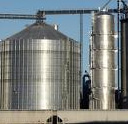Sustainable biofuel production

The reason for his invitation, however, became clear to him, as food riots erupted around the globe this year.
Cox and fellow scientists argue that a "perfect storm" has formed, one in which high petroleum prices combined with soil erosion, the increase in price of nitrogen-based fertilizer, government waste and corruption, crop failures in Australia, and growing food demand have strained the world's ability to feed itself, especially in developing nations. The resulting increase in food prices has led to violent unrest across Asia, the Caribbean, and Latin America.
The United Nations World Food Programme yesterday said high food prices have caused "a silent tsunami threatening to plunge more than 100 million people on every continent into hunger."
Cox says a new culprit is exacerbating this already grave problem: biofuels.
"Expanding biofuel production from grain," he said, "is adding to the severity of food shortages and threatens to undermine future food production."
Agricultural staples such as corn and soybeans are increasingly used to produce biofuels like ethanol and biodiesel, respectively, rather than food. The United States has ramped up its food-based biofuel production in an effort to end its dependence on foreign oil and combat global warming.
According to the White House, ethanol production has quadrupled from 1.6 billion gallons in 2000 to 6.4 billion gallons in 2007. The increased production of ethanol comes primarily from corn, and it has made the United States the number one producer of the alternative fuel worldwide.
But this shift from producing corn and soybeans for fuel rather than food has affected global food supplies.
A 2006 paper published by the Proceedings of the National Academy of the Sciences of the United States of America (PNAS) said that “Neither biofuel [ethanol or biodiesel] can replace much petroleum without impacting food supplies.”
With increased demand for already scarce foodstuffs, prices have soared, benefit ting corn and soybean producers but harming poor consumers internationally.
A bushel of corn in February, according to the U.S. Department of Agriculture, cost about $3.50, while a bushel of soybeans cost about $9.00, both up drastically since 2005. USDA projects these prices should stay relatively stable through 2017.
Aside from price concerns, Cox said, food-based biofuels would do little to meet our energy needs. The PNAS study agreed, stating, “Even dedicating all U.S. corn and soybean production to biofuels would meet only 12 percent of gasoline demand and 6 percent of diesel demand.”
A partial solution to this increasingly complex problem would be to produce biofuel from nonfood sources.
Biofuel production from nongrain biomass such as sugarcane, Cox said, “would be less destructive than grain biofuels.”
Even then, he said, nongrain biofuel would not satisfy our future fuel demand unless we sharply reduced our overall demand for fuel across the board.
Any copying and distributing the material of Ukrainian Biofuel Portal
without active hyperlink is stricly prohibited !
Link to this news: Sustainable biofuel production
Copy & Paste This Code to your website:
Views: 3112 Added: 17-01-2009
Average Rating:
Sustainable biofuel production








